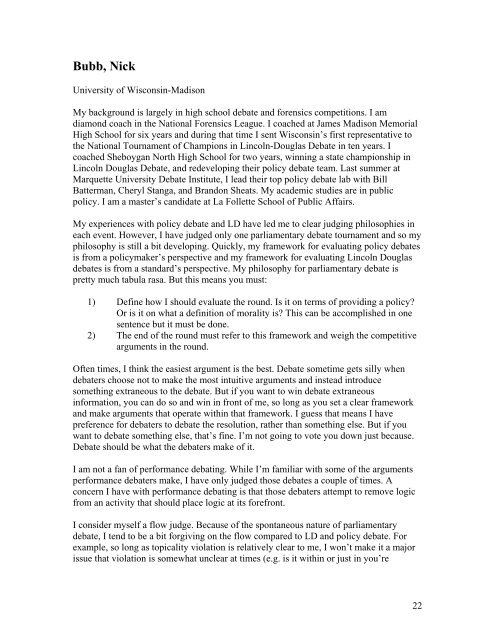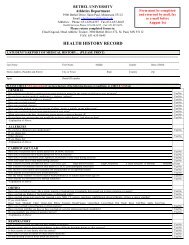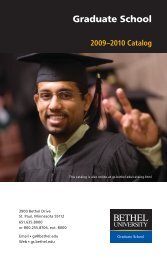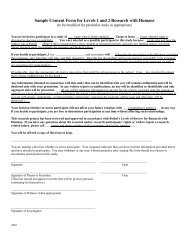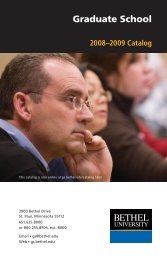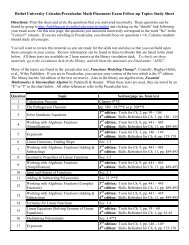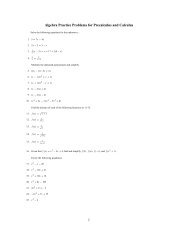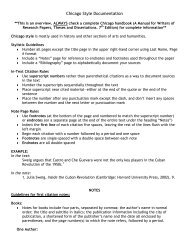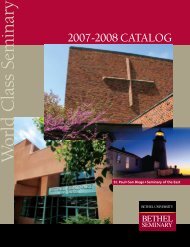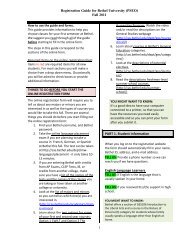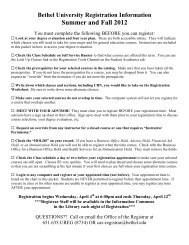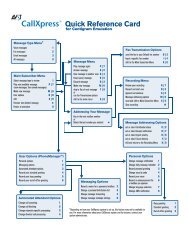here - College of Arts & Sciences - Bethel University
here - College of Arts & Sciences - Bethel University
here - College of Arts & Sciences - Bethel University
You also want an ePaper? Increase the reach of your titles
YUMPU automatically turns print PDFs into web optimized ePapers that Google loves.
Bubb, Nick<br />
<strong>University</strong> <strong>of</strong> Wisconsin-Madison<br />
My background is largely in high school debate and forensics competitions. I am<br />
diamond coach in the National Forensics League. I coached at James Madison Memorial<br />
High School for six years and during that time I sent Wisconsin’s first representative to<br />
the National Tournament <strong>of</strong> Champions in Lincoln-Douglas Debate in ten years. I<br />
coached Sheboygan North High School for two years, winning a state championship in<br />
Lincoln Douglas Debate, and redeveloping their policy debate team. Last summer at<br />
Marquette <strong>University</strong> Debate Institute, I lead their top policy debate lab with Bill<br />
Batterman, Cheryl Stanga, and Brandon Sheats. My academic studies are in public<br />
policy. I am a master’s candidate at La Follette School <strong>of</strong> Public Affairs.<br />
My experiences with policy debate and LD have led me to clear judging philosophies in<br />
each event. However, I have judged only one parliamentary debate tournament and so my<br />
philosophy is still a bit developing. Quickly, my framework for evaluating policy debates<br />
is from a policymaker’s perspective and my framework for evaluating Lincoln Douglas<br />
debates is from a standard’s perspective. My philosophy for parliamentary debate is<br />
pretty much tabula rasa. But this means you must:<br />
1) Define how I should evaluate the round. Is it on terms <strong>of</strong> providing a policy<br />
Or is it on what a definition <strong>of</strong> morality is This can be accomplished in one<br />
sentence but it must be done.<br />
2) The end <strong>of</strong> the round must refer to this framework and weigh the competitive<br />
arguments in the round.<br />
Often times, I think the easiest argument is the best. Debate sometime gets silly when<br />
debaters choose not to make the most intuitive arguments and instead introduce<br />
something extraneous to the debate. But if you want to win debate extraneous<br />
information, you can do so and win in front <strong>of</strong> me, so long as you set a clear framework<br />
and make arguments that operate within that framework. I guess that means I have<br />
preference for debaters to debate the resolution, rather than something else. But if you<br />
want to debate something else, that’s fine. I’m not going to vote you down just because.<br />
Debate should be what the debaters make <strong>of</strong> it.<br />
I am not a fan <strong>of</strong> performance debating. While I’m familiar with some <strong>of</strong> the arguments<br />
performance debaters make, I have only judged those debates a couple <strong>of</strong> times. A<br />
concern I have with performance debating is that those debaters attempt to remove logic<br />
from an activity that should place logic at its forefront.<br />
I consider myself a flow judge. Because <strong>of</strong> the spontaneous nature <strong>of</strong> parliamentary<br />
debate, I tend to be a bit forgiving on the flow compared to LD and policy debate. For<br />
example, so long as topicality violation is relatively clear to me, I won’t make it a major<br />
issue that violation is somewhat unclear at times (e.g. is it within or just in you’re<br />
22


